Menu
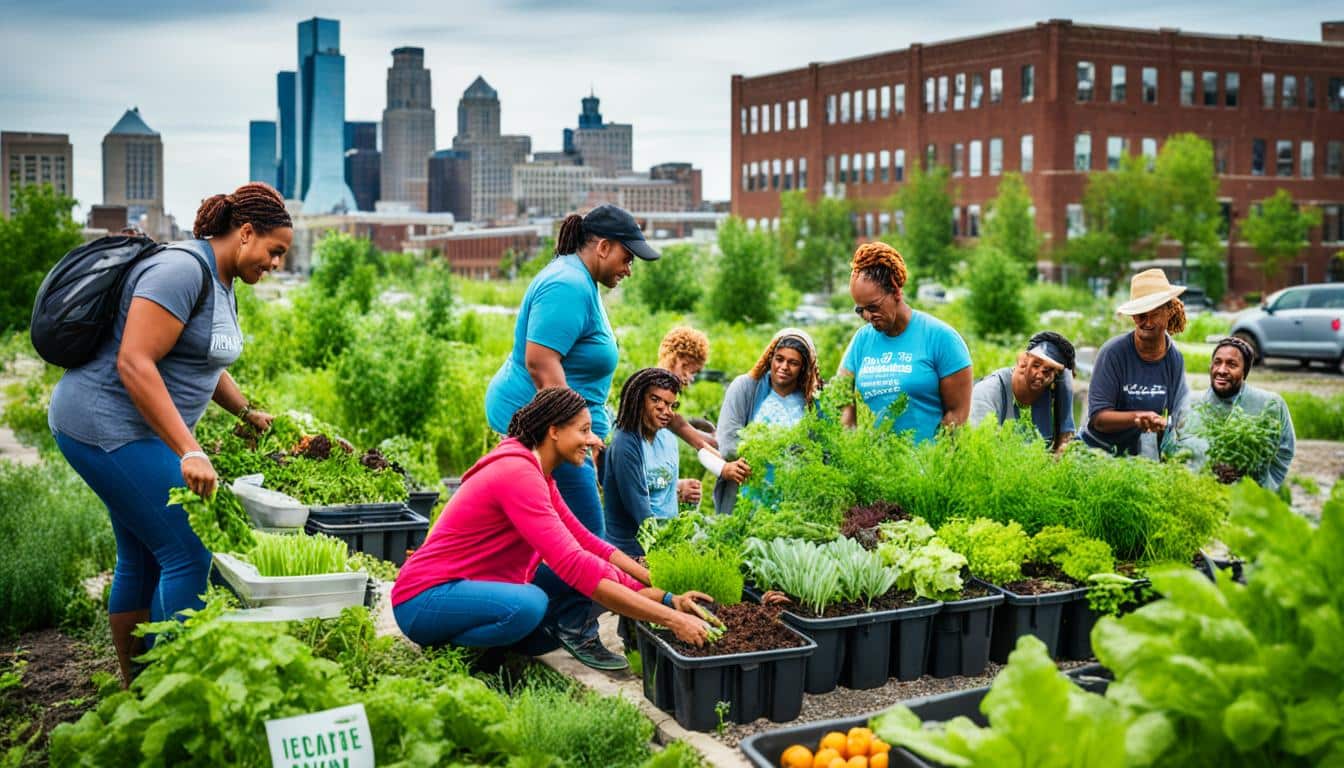
Did you know Detroit has the highest poverty rate in the US? Despite this, it’s leading an urban farming movement. This comes after tough economic times. Now, urban farming is changing Detroit, offering hope and new food systems.
With Detroit’s poverty and lack of food, urban farming is crucial. The Michigan Urban Farming Initiative and Hantz Woodlands changed unused spaces into farms. These projects help the community and show how urban areas can transform.
This look at urban farming in Detroit shows its special path from decline to growth. It uses the community to fight hunger and make farming sustainable and impactful. Thanks to these efforts, Detroit is not just feeding its people but also creating change.
Detroit’s urban farms have changed a lot. They show how the city moved from big industry to hard times, then blossomed again. Looking into the history of Detroit urban agriculture, we see a story of people coming together and trying new things. This process is very important for the city’s comeback after the big industry left.
In the early 1900s, Detroit was a top spot for making cars. But things got tough later on, leading to many empty spaces. This is where Detroit urban agriculture programs stepped in. They turned these forgotten areas into places where communities could grow food and come together.
Urban farming in Detroit was not just about growing food. It was a powerful way to fight back against the city’s problems. Local people and groups worked hard to change the empty spaces into something useful, making their areas better places to live. This effort echoes the worldwide trend of using city spaces to grow food and build community.
Places like Detroit need something special to bounce back from hard times. Urban farming is playing a big part in this recovery. It helps in many ways, not just by growing fresh, local food but also by making the environment cleaner and bringing people together.
Studies clearly show the role of urban farming in building a better future. For example, in the US, more and more people are turning to urban farming to support their communities. This steady growth highlights the positive impact of such projects.
The history of Detroit urban agriculture points to its goals being much more than economic or environmental. It is a way to strengthen communities and help people, especially the young, eat better. Community gardens, for example, have made a big difference in how well people know and get along with their neighbours.
Urban farming gives real benefits to society and the economy. It helps make sure there is enough food and brings people together. It also helps the environment by improving how we use local resources.
Getting involved in community gardens and local meetings can make a big difference in how we think about food and the community, especially for young people.
The achievements in Detroit urban agriculture programs show what’s possible for other cities facing similar challenges. By supporting sustainable growth and community effort, urban farming doesn’t just help local economies. It also builds a sense of community and shared responsibility.
| Aspect | Impact |
|---|---|
| Social | Enhanced community cohesion and health benefits |
| Economic | Job creation and local economic stimulation |
| Environmental | Increased sustainability and better resource management |
Detroit is a standout for its urban farming initiatives. It changes empty places into lively gardens. These gardens help in fighting poverty by offering fresh food. They also bring people together. Lots of residents, non-profits, and businesses work together on these projects.
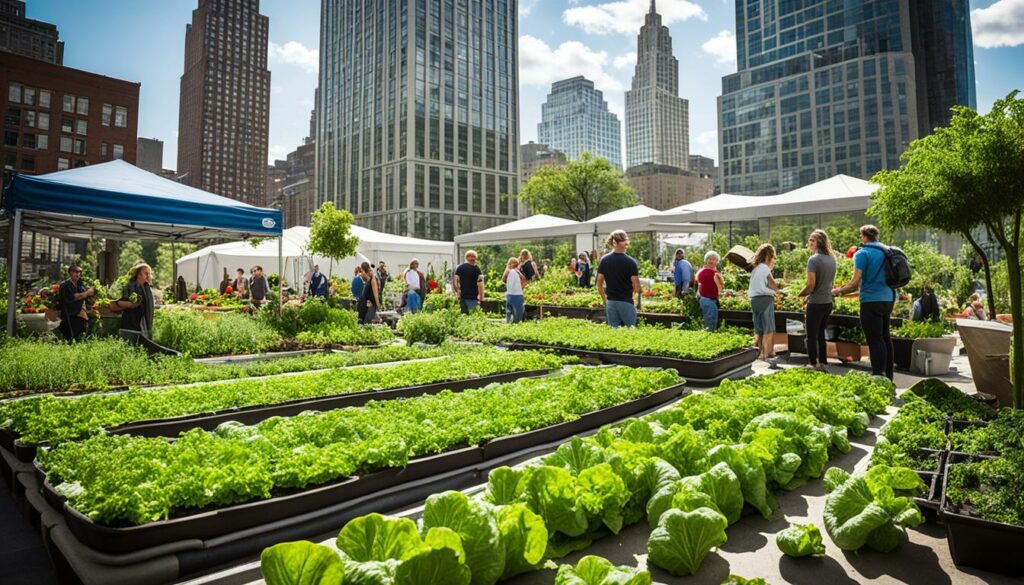
The growth of Detroit community gardens owes much to grassroots work. There are now over 1,500 gardens in the city. These are cared for by 23,000 people. The Michigan Urban Farming Initiative is working on a large project in the North End area. It aims to create a big urban farming community. Also, the Detroit Black Community Food Security Network looks after a seven-acre farm to help with the lack of food in some areas.
Government played a big part in getting urban farming going in Detroit. Laws like the Right to Farm laws protect urban farmers. Also, the city supports projects to make more local food available. The city has a plan to change empty spaces into green areas. This might affect around 90,000 people. But the goal is to make these places better.
The Detroit Kitchen Connect programme at Eastern Market helps too. It matches up chefs with kitchens. Plus, big companies like General Motors and individuals like John Hantz help a lot. They give things like steel crates for gardens. Hantz also bought a lot of land for green projects. This shows a strong effort from many directions to support urban farming initiatives in Detroit.
Urban agriculture is changing places like Detroit with sustainable farming. These practices keep the environment healthy and help the economy. They also make life better for people who live there.
In cities, sustainable farming uses smart methods to take care of the earth. It’s about using resources well and not harming nature. Everyone wins when water is saved, the soil is healthy, and we reduce our impact on the planet. Farming techniques like rotating crops and making compost help do this.
Urban agriculture does more than grow food. In Detroit, it fights poverty by making fresh food available cheaply. It also turns empty, unused land into green areas. This makes the air and the ground better for everyone.
Groups like the Michigan Urban Farming Initiative are also helping the economy there by creating jobs. And they’re bringing communities together. Detroit’s North End area shows how farming can change a city for the better. It offers a new way to plan cities, making them both greener and happier places to live.
| Key Benefits | Impact on Detroit |
|---|---|
| Environmental | Less pollution, healthier soil |
| Economic | More jobs, healthier businesses |
| Social | People working together, better food for everyone |
In Detroit, many groups lead in changing the city’s farming scene. They are working hard to make urban farming sustainable. They are also solving issues like lack of food and unused land. Let’s look at what these groups are doing.
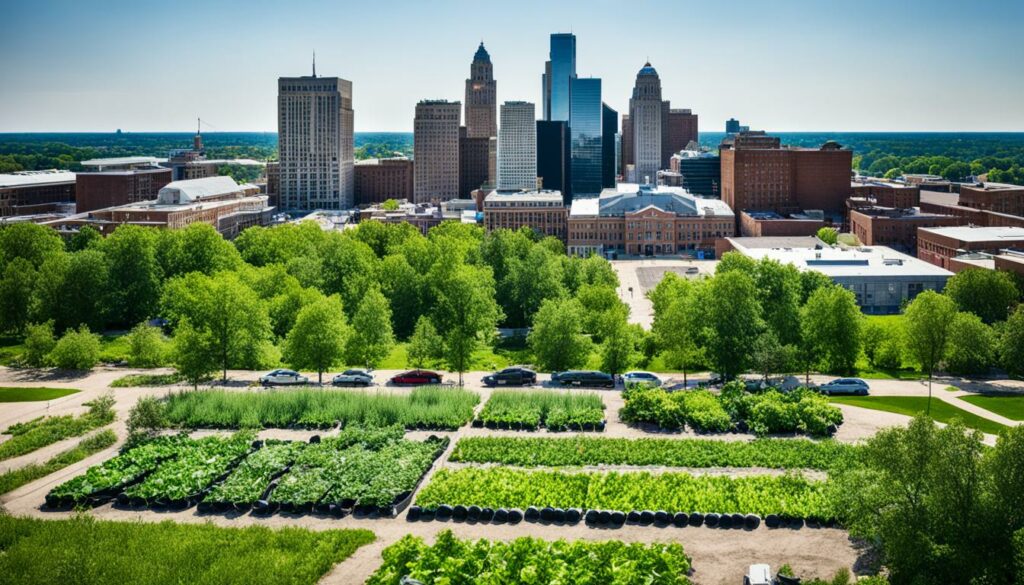
The Greening of Detroit is changing the city with more trees and green spaces. They also help people garden together. This makes Detroit greener and teaches people about eco-friendly ways.
Earthworks Urban Farm gets the community involved in learning how to farm well. They work to bring people together and teach them farming skills. This makes farming in the city successful.
The Detroit Black Community Food Security Network fights for better food in places that have been ignored. They teach and improve food access. This helps stop areas from not having enough food.
Michigan Urban Farming Initiative has a cool idea called agrihood. It mixes farm life into living spaces. This way, people can grow their own food and live healthier in Detroit.
The Greening of Detroit, Earthworks Urban Farm, the Detroit Black Community Food Security Network, and Michigan Urban Farming Initiative are together making Detroit’s farming world better. They’re greatly affecting the local people and the whole American urban farming scene.
Since 1989, the Greening of Detroit has worked hard to make the city greener and better. It’s the top group in urban farming in Detroit. They’ve planted over 146,000 trees, changing the city’s look and feel.
The Greening of Detroit has a big goal: to plant trees and create green areas in the city. So far, they’ve planted an amazing 85,000 trees. This work is not just about making the city look nicer. It also helps the environment and makes life better for everyone. Other cities, like Philadelphia, have seen this improve property values.
The Garden Resource Program is a big part of what the Greening of Detroit does. It began by helping 42 families and 39 gardens. This work helps make local places greener and gets people involved. They give out tools and other stuff to help keep gardens going. This means more food and strong communities.
The urban agriculture adult apprenticeship programme is all about jobs and skills. It trains adults in farming right in the city. This helps adults learn and get better jobs. It also makes the city’s economy stronger.
Detroit has faced big changes with less people and tough times. Urban farming is helping it get better. The city’s green spaces and gardens are making Detroit a more lively and united place.
Earthworks Urban Farm is a shining light in Detroit. It merges *community engagement* with *urban agriculture education* beautifully. The organisation connects people by encouraging them to take part and feel a part of the community garden.
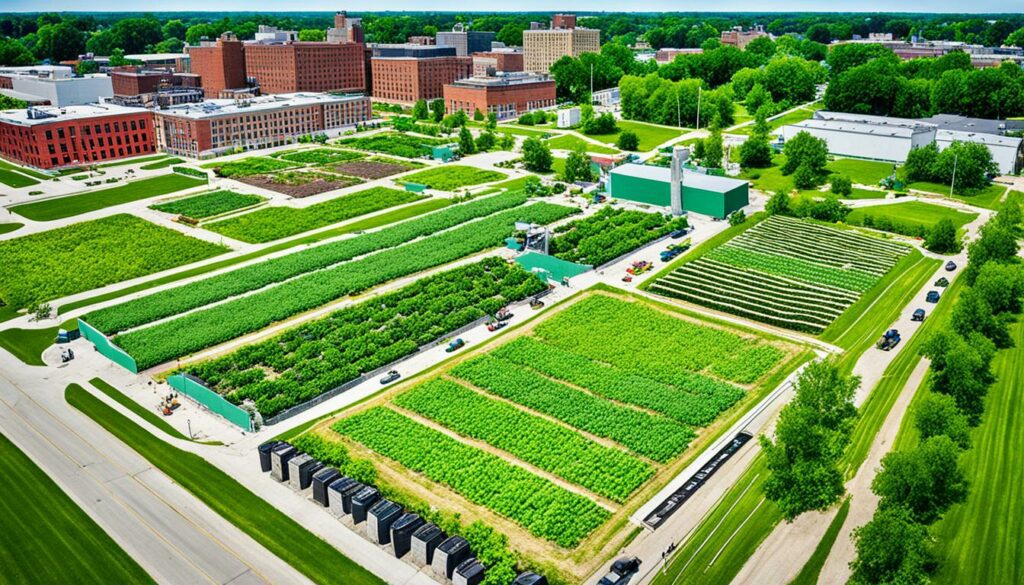
In the midst of Detroit’s economic struggles, Earthworks Urban Farm stands firm. It uses empty lands, turning them into vibrant farms. Detroit’s high unemployment and poverty rates make this farm so much more than just a place for food. It gives people hope.
At Earthworks Urban Farm, education is key. They offer workshops and training that teach people how to do *urban agriculture* right. This practical learning means that anyone can get involved in *community engagement farming* and grow local food.
This approach is crucial in a city that’s bouncing back from bankruptcy. It turns knowledge into action, making urban agriculture truly sustainable. This way, they’re not just teaching; they’re changing their city for the better.
Earthworks Urban Farm is a big part of Detroit’s urban farming scene. This movement has over 1,400 gardens and farms that produce lots of food each year. It brings life to places that were forgotten, making the community stronger and more hopeful.
In Detroit, many face a lack of food and living in poverty. This makes dealing with food security very important. The Detroit Black Community Food Security Network (DBCFSN) is vital in helping to combat these problems. They work on many ways to improve people’s access to food.
The DBCFSN focuses on getting food to people all over Detroit. Since many don’t have jobs or cars, it’s key to make sure fresh food gets to everyone. D-Town Farm, started in 2008 by the DBCFSN, grows more than 30 different fruits and veggies. This helps provide local, healthy food to the residents. They also work with many organisations to help people live healthier.
Teaching the community is a big part of what the DBCFSN does. They have over 70 members, mainly women, who offer internships and jobs at D-Town Farm. This helps teach people farming skills. From 2006 to 2010, the DBCFSN was funded by its members. Later, it got help from big grants like the one from the USDA in 2015.
“To ensure food security in Detroit, community education and engagement are indispensable for long-term sustainability,” – Detroit Black Community Food Security Network.
They’ve also grown their farming work at Rouge Park, initially costing them $1 a year. By 2010, this farm was seven acres big. This shows how they are making big steps in their food security work.
| Metric | Statistic |
|---|---|
| Members | Over 70, 80% women |
| D-Town Farm Area | 7 acres |
| Types of Produce Grown | Over 30 |
| Annual Internships | Around 10 |
The Michigan Urban Farming Initiative (MUFI) is making agrihoods a reality in Detroit’s North End. Their vision is to bring farming into the neighbourhood and let people grow their food. This means residents can get fresh vegetables and fruits easily, making the area more self-sufficient.
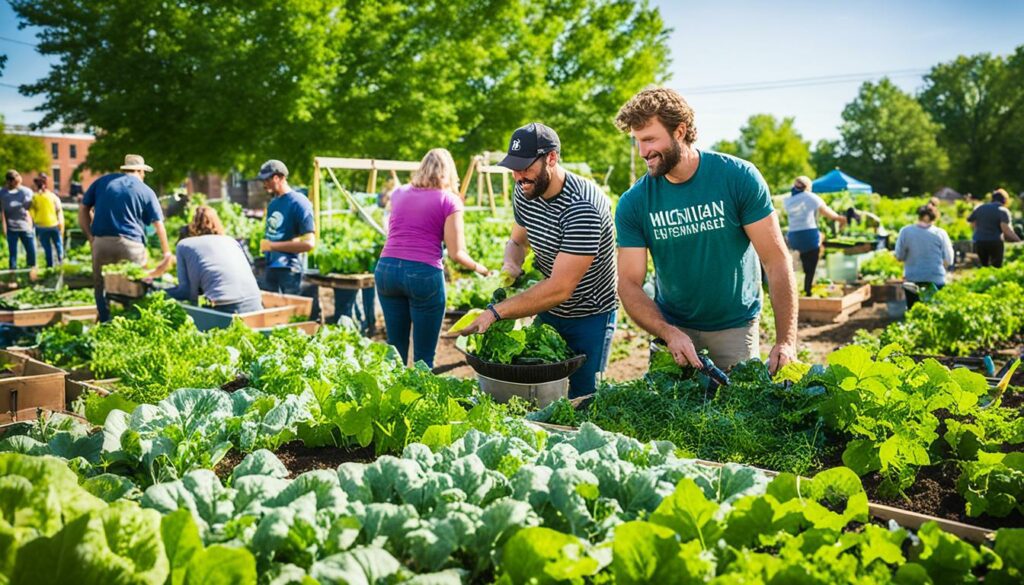
Agrihoods are about joining city life with farming. They create a community that works together on growing food. This way, they fight poverty and lack of food access in places like Detroit. Here, 1 in 10 residents find it hard to get enough food, says the USDA.
MUFI’s three-acre farm produces a lot of food, about 50,000 lbs each year. This food helps about 2,000 families. The agrihood idea not only makes sure there’s enough food but also brings people together through farming.
Looking at other places like Serenbe, Agritopia, and Prairie Crossing, we see how well agrihoods can work. MUFI’s work in Detroit shows the power of green projects. They change cities for the better by adding community farming.
Urban agriculture in Detroit has become a powerful force. It brings many benefits, not just growing food. It boosts the economy, strengthens social ties, and helps take care of the environment. These effects change Detroit for the better.
Urban farming in Detroit is making a big economic impact. It creates jobs and turns empty lots into growing spaces. There are over 105,000 of these lots altogether. A study in 2019 showed that small-scale farming can be very successful economically with the right care. It needs good planning to be sustainable. Also, a 2017 study discussed how consumer support is crucial for the success of such farming.
Urban farming in Detroit also has major social benefits. It’s not just about growing food; it brings people together. Community gardens in New York have already shown how they boost health and bring people closer. Detroit’s 350 to 1,600 urban farms have done the same. They provide a learning space and involve young people in positive ways, making them feel part of something important. These projects help fight the feeling of being apart in big cities, building a strong sense of community and friendship.
The environmental gains of Detroit’s farming are not to be understated. Green practices like crop rotation and composting are common. These methods improve soil and decrease the need for chemicals, making a better city ecosystem. Studies have shown that these activities increase green space and biodiversity. By turning waste land into green areas, Detroit’s urban farms enhance both soil and air quality. This also helps the city be ready for climate changes.
| Statistical Data | Source |
|---|---|
| Urban population in the United States | World Bank, 2018 |
| Consumer behaviour and urban agriculture success | Grebitus C., Printezis I., & Printezis A., 2017 |
| Marketing channels for local food | Printezis I., & Grebitus C., 2018 |
| Small-scale urban agriculture yields | McDougall R., Kristiansen P., & Rader R., 2019 |
| Food gardening in America | National Gardening Association, 2014 |
| Community gardens impact | Armstrong D., 2000 |
| Health impacts of outdoor environments | Abraham A., Sommerhalder K., & Abel T., 2010 |
| Net primary production in community gardens | Parece T.E., & Campbell J.B., 2017 |
Exploring success stories in urban agriculture shows us how well it can work, especially in places like Detroit. By looking at these stories, we see the impact of urban farming on the city’s look and on people’s lives.
A key success story is Keep Growing Detroit. In their 2019 report, they showed their great work in supporting urban farmers. This effort brought in good harvests and kept things going strong, as confirmed by experts.
Earthworks Urban Farm is another standout. Their work in teaching and engaging with the community has been a big win. It’s led to better health and well-being, as shown by studies on this type of farming in New York and Denver.
The Detroit Black Community Food Security Network also stands out. They’ve made a big difference by sharing food and teaching about it in needful neighbourhoods. Such work matches research showing better diets for urban community gardeners.
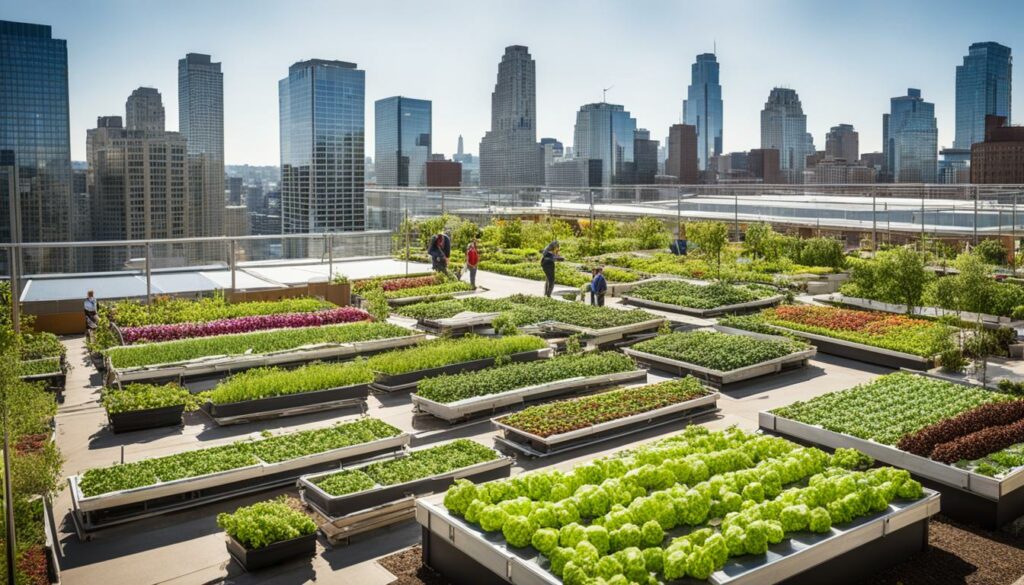
The Michigan Urban Farming Initiative (MUFI) has shown bold new ideas. They’ve put farming right next to homes to ensure self-reliance. This strategy mirrors what experts suggest for urban farming without using much space.
These stories show how urban farming can offer both money and a green living. Money comes in from CSA schemes, farmers’ markets, and sales. This mix of income sources proves urban farming’s strength to change cities like Detroit for the better.
| Organisation | Key Achievements | Study/Report |
|---|---|---|
| Keep Growing Detroit | Significant relationship building, high agricultural yields | 2019 Annual Report |
| Earthworks Urban Farm | Community engagement, health promotion | Armstrong (2000); Teig et al. (2009) |
| Detroit Black Community Food Security Network | Food sovereignty, educational outreach | Alaimo et al. (2008) |
| Michigan Urban Farming Initiative | Agrihood implementation, local food systems | Thomaier et al. (2014) |
These stories show the huge difference urban farming can make in places like Detroit. They serve as a model for other cities, highlighting urban farming’s role in bringing new life and power to the community.
Detroit’s progress in urban agriculture faces key urban agricultural issues. These problems often slow or complicate work for urban farmers and groups. One issue is getting access to land. Complicated ownership and laws can stop using empty areas well.
There are also socioeconomic obstacles in Detroit. Being the poorest big city in the U.S. makes it hard. Lack of money can limit resources and community involvement. Plans to turn some areas into green spaces could mean 90,000 people need to move. This move impacts the environment and people’s lives.
Detroit’s history and political scene make these urban agriculture challenges worse. The city wants to turn empty areas into green areas over 50 years. This is good, but it questions fair access and who benefits.
The city’s past choices also play a part. For example, in 2012, it sold 180 acres to a developer. The goal was to create real estate value, not grow food. This shows a conflict between farming goals and making money off land. Efforts like the Michigan Urban Farming Initiative in the North End area face these issues.
To address these challenges, everyone involved needs to work together. This includes leaders, groups, and farmers. Overcoming these Detroit farming hurdles is key. It will help grow a sustainable and fair urban farming scene in Detroit.
In Detroit, urban farming is governed by local, state, and federal rules. These rules are key to the success of farming in the city.
Detroit’s local government supports urban farming. It has a 50-year plan to turn empty areas into green spaces for farming. While this helps with food security and the environment, some worry about displacement of about 90,000 people.
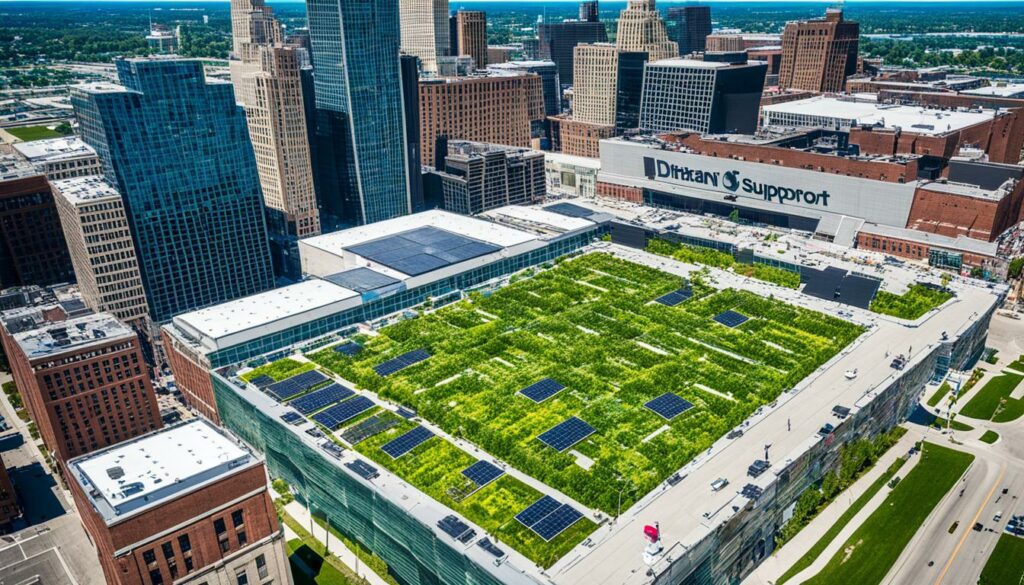
City officials sold 180 acres to John Hantz in 2012 for growing trees. This shows how city policies must balance business and community needs.
State and national rules also heavily influence Detroit’s farming laws. They set the ground for how urban farmers can operate, addressing issues like zoning and land rights. Zoning laws, for example, decide where farms can grow.
Farmers often get help from the state and federal levels. But dealing with the rules can be tough, needing strong support from the government.
| Aspect | Description |
|---|---|
| Local Government Policies | City’s 50-year plan, land sales like the 180-acre sale to Hantz |
| State Regulations | Zoning laws, grants, and funding support |
| Federal Regulations | USDA guidelines, agricultural policies |
| Challenges | Displacement, balancing commercial and community interests |
It’s vital to understand and manage all levels of regulations in Detroit. This includes local, state, and national policies. Doing so helps to build a strong urban farming system in the city.
Detroit is transforming through urban agriculture despite tough challenges. It has the highest poverty rate in the U.S., causing strong social and economic issues. However, initiatives like the Michigan Urban Farming Initiative (MUFI) show a bright future for long-term sustainability farming.
In 2013, Detroit started a 50-year plan to turn vacant areas into green spaces. This plan is key for a better tomorrow, especially because the city lost many people over the years. Through urban agriculture, Detroit aims to grow economically, ensure food for all, and strengthen the community.
Detroit’s future in urban farming looks positive thanks to its people and their actions. By using empty spaces for farms, the city is making progress. The “Detroit Future City” plan, started in 2012, highlights the city’s official support for these efforts. With both local and government help, urban farming could become a major part of Detroit’s story, inspiring others worldwide.
The Detroit agriculture forecast mixes challenges with chances. Even with high poverty and issues like people moving away, there’s hope. The rise of agrihoods and creative urban farming models point towards a better future. Looking ahead, a united approach to urban agriculture can lead to great progress, making Detroit shine as a model for sustainable city renewal.
In Detroit, community gardens are making a big difference. They are not just growing fresh food. They also help people connect and improve life for many. These green areas are a key part of Detroit’s changing look.
Community gardens bring people together in Detroit. They are places where neighbours can meet and work together. They help neighbours from all walks of life become friends by sharing common activities.
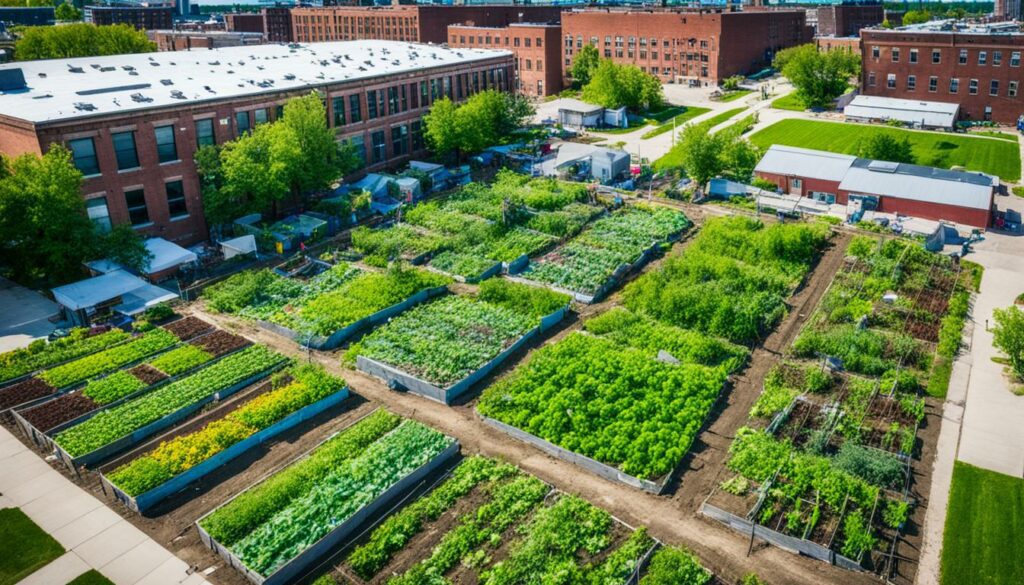
The Fenway Community Gardens in Boston charge a small fee for plots, making it accessible to many. This low cost encourages a strong community feel, with shared gardening and local events. In Detroit, over 23,000 people are actively involved in urban gardening.
The Detroit Black Community Food Security Network runs D-Town Farm in Rouge Park. This seven-acre farm shows the impact of community-led farming. It has organic fields, beehives, and a hoop house for crops all year. D-Town Farm is a prime example of neighbourhood change through farming.
The Green Grocer Program also focuses on better food access in Detroit. It aims to bring more food stores to the city. This effort, together with support from local groups and foundations, highlights Detroit’s strong bond in urban farming. It shows how people are working together to make a real change.
In short, Detroit’s community gardens are key to better social ties, area improvement, and sustainable living. They are more than places that grow food. They are about making communities stronger.
Urban agriculture in Detroit is vital for social justice. The city faces huge challenges, like 27.5% unemployment. 38.1% of its people live below the poverty line. Initiatives in urban farming are offering hope to many.
Over the years, Detroit’s population fell from 1.8 million to 677,000 residents. This left 105,000 empty spaces. Turning these areas into farms isn’t just good for the environment. It’s also boosted agricultural inclusivity.
People in Detroit now grow their own food. This helps address the lack of food and makes the city’s food systems fairer. For example, the Detroit Black Community Food Security Network is helping many in need.
Between 350 and 1,600 community gardens and farms have been set up. This marks real progress in fighting social injustices. The city’s efforts are supported by new policies and modern farming techniques.
In the last decade, support for urban farming has grown. This shows a strong commitment to fairness. Detroit is leading the way in making sure everyone has a chance in agriculture.
Urban farming in Detroit is more than just about food. It has become a key part of the city’s life, economy, and environment. By making farming accessible to everyone, it’s working towards a better and fairer city. Detroit’s farms are not only feeding people but also fighting for justice and community empowerment.
Once famous for its industry, Detroit now shines as an example of change. This urban agriculture Detroit case shows how people and the government are making the city green again. Projects like planting trees with the Greening of Detroit and MUFI’s urban farming are beating food deserts and making the city greener.
Groups like Earthworks and the Detroit Black Community Food Security Network are key. They teach us about food, how to get it, and fairness. Working together, they show urban farming helps cities grow, brings people closer, and saves the planet. Indeed, Detroit is leading the way, becoming a worldwide model for eco-friendly city living.
Looking back on Detroit’s changes, it’s clear: urban farming is vital, not just a phase. By adding farms to city life, Detroit is paving a new way for old factory towns to come back to life. This study is not just about Detroit’s story; it also shares important lessons for other cities keen to use urban farming’s power.
The case study looks into how urban agriculture is changing Detroit after tough economic times. It shows how growing food in the city changes the way we use space and think about food. This new way of farming might also work in Europe.
Detroit used to be a big industrial city but changed due to economic challenges. Urban agriculture has become important for its renewal. This change highlights the value of growing food in cities for building communities and a healthy and fair food system.
Many groups like local movements, charities, businesses, and the government have helped urban farming in Detroit. Key organisations include Greening of Detroit and Earthworks Urban Farm. They have been vital in pushing these efforts forward.
In Detroit, sustainable farming saves water, protects the soil, and supports the local economy. These efforts also focus on making sure the environment, the economy, and people’s well-being all benefit.
Greening of Detroit helps by planting trees, creating green areas, and running educational and job programmes. Their efforts lead to a more sustainable and green city.
Earthworks Urban Farm brings communities together through education about food. It teaches people how to farm in a way that doesn’t hurt the environment.
This network aims to make sure everyone has access to good and fair food. They tackle issues like food deserts by providing food and education.
This initiative combines farming with living to improve communities and access to good food. It’s a new way to live and farm in Detroit.
Urban agriculture in Detroit creates jobs and supports local businesses. It’s a key part of making Detroit’s economy stronger.
It brings people together, making communities stronger and more welcoming. Community gardens, in particular, help build bonds among neighbours.
Urban farming helps the environment by saving resources and making the city greener. It cuts down on harmful emissions and supports more plants and animals.
Successful projects include planting trees by Greening of Detroit and the agrihood concept by Michigan Urban Farming Initiative. These show how urban farming can bring new life and power to communities.
The movement faces problems with government rules, sharing land, and making it work for everyone. Solving these issues needs work from everyone involved.
Many laws and rules at local, state, and national levels affect how farming in the city works. They might help or make it harder to farm in cities.
The future for farming in Detroit looks bright with more people, policies, and projects getting involved. It could lead to a stronger and greener city in the long run.
Community gardens are vital for bringing people together and making areas more welcoming. They allow neighbours to work together, share, and grow closer.
Urban agriculture is a powerful tool for fairness. It helps fix food problems, makes resources fair, and empowers those who have been left out.